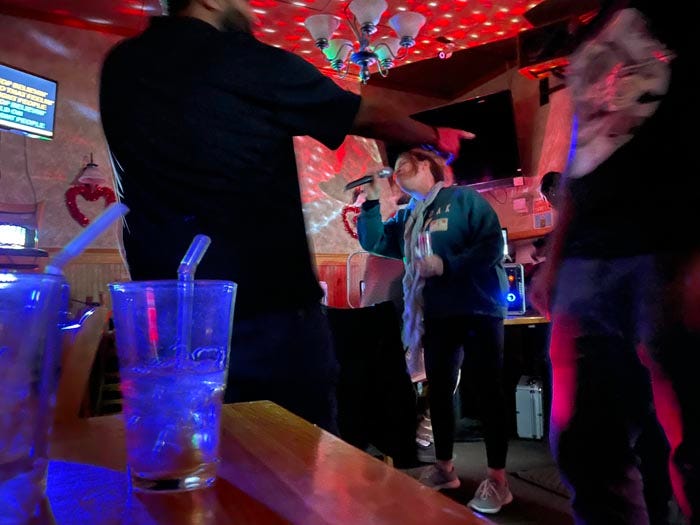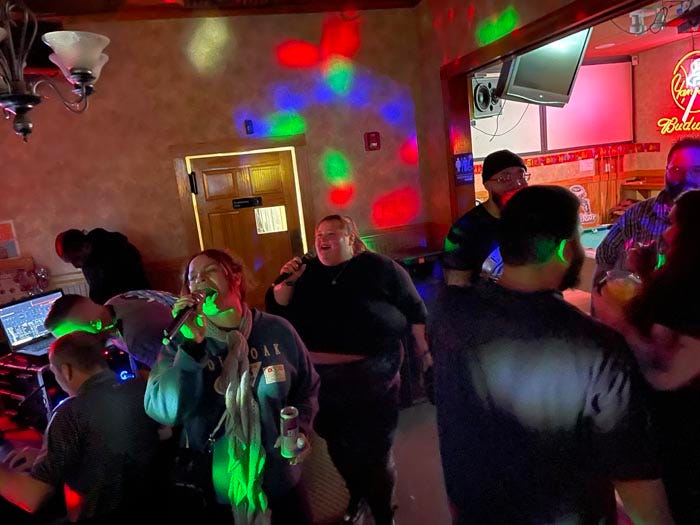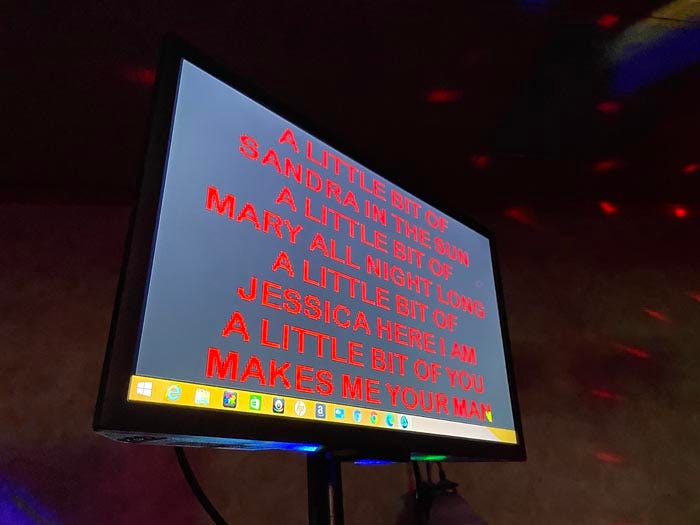Smoke Plume in Palestine? Karaoke at Chics!
Life is short. Derailed train cars of burning vinyl chloride are long. Karaoke is forever.
Too late, the man with the microphone realized the key of the song wasn’t great for his vocal range. He hadn’t yet made it through the opening verses of Bill Wither’s “Use Me” and was struggling gamely along when another man up at the front of the bar hit a woman and all hell broke loose.
The Friday night drinking crowd took matters into their own hands. Surging as a group of restraining hands and punching fists, they grabbed the attacker and hauled him to the parking lot outside. Which was probably for the best.
Use Me, a song about sexual satisfaction despite the warnings of friends and family members sounds like an easy song to sing along to. Good luck if you don’t have Bill Wither’s baritone.
But a musical ear is not a requirement for fans of karaoke and all the same the crowd was disappointed when the music cut off.
This all was happening at Chic’s sports bar and restaurant down in the Kingston Plaza, next to where the off-track betting office used to be. Authentic times, pre-Covid, had by all.
Up to this point, before the guy at the front of the bar went looking for an assault charge, the night had gone swimmingly. A vibrating glow surrounded each performer as consecutive rounds of booze lubricated the momentum of the night.
Max, a 32-year-old barback kicked off a round of songs with an unexpectedly spirited rendition of John Denver’s “I’m Sorry”.
Jimmy Ha, a 38-year-old bass player sang Barry Manilow’s “I Write the Songs. (That make the whole world sing).”
Phil, a 56-year-old with a voice that communicated life’s experience brought low by twang and nostalgia sang a country pop number, phrases unfamiliar, title never revealed.
A plumber. A CVS store clerk. A computer programmer. A phlebotomist. Indiscriminately, the spotlight transforms all.
All that’s required to capture the attention of the room for the length of a song is a hot mic under swirling party lights and a modest PA system.
And a DJ to cue up the tracks, like Nick Denise.
“I've been here every Friday almost eight years now,” says Denise, his voice raspy, with warm color. “Except for the COVID shutdown. The hours suck, but it’s good money.”
With an average of 53 Fridays in a year, adding up all the nights of Nick’s years-long hustle amounts to 1 year and 60 days of Fridays spent setting up willing chanteuses, buzzy sirens, campy hotshots and disturbed loners, to cover everything from Billy Joel’s “Captain Jack” to the Darkness’ “I Believe in a Thing Called Love.” Denise considers himself happy to do it.
“I own my own library. Half a million songs on this little…” he points at an external hard drive without naming it. “I think that’s a two terabyte. My father started doing this about 25 years ago,” recalls Denise. “Oh yeah, CDs! When I turned 16, I was carrying boxes of CDs for him. 20 bucks a night. And carry the speakers and the equipment. So I’m second generation. I used to carry crates and crates of CD’s, for like 80,000 songs. It's a big difference.”
Vinyl Records. Cassette Tapes. Compact Discs. Flash Drives. Empty Orchestra.
Denise just laughs when asked whether other Karaoke DJ’s might want to hone in on his turf.
“There are a couple other guys out there. Some of them are good. Some of them I like a lot. Some of them you know… it is what it is. Actually the beef I get most of the time is with real DJs and real musicians. Because neither one of them really like what I do.”
Contrasted with the professionals and the performers manufactured by the musical industrial complex for mass consumption. The shifty karaokeist is obligated to no-one. And while good looks and high fashion aren’t necessary, all crowds everywhere at all times love a brazen and wanton performer. Pumping hips. Stroking arms. A dramatic turn and a saucy lookback over the shoulder. Do it like the pros do it.
“I don't like the uppity musicians,” says Denise. “They come and say what is this? This is off key! I’m like I didn't record this! It cracks me up. Whether they like it or not, you know, that's what we're here for. I've had some terrible singers that the house just goes crazy for. And it's like, whoa, what's going on here? It's the, you know, the energy they bring.”
Englebert Humperdink’s “The Last Waltz” follows Lou Bega’s “Mambo #5”.
Sublime’s “Santaria” gets neutralized by Leonard Skynard’s “Simple Man”. Dolly Parton’s “Joleen” cries fearful tears. Big Steve covers Biggie Small’s “Big Poppa”. Jon Bon Jovi’s “In these Arms” begs, steals and dies.
“I think it's a release,” says Denise. “You know, how many of us want to be want to be rock stars? Front man in the band, you know what I mean, right? But you don't play any instruments, don’t have the great singing voice. You know, you come out here and cut up.”
“I tell people all the time,” says Denise. “They're like, oh, I want to sing but I don't know what to sing. I say what do you catch yourself singing in the shower? Yeah, that's the shit we want! You know? When you’re in the car and you’re just jamming something out, sing that. I could sing with most of these people any song that they pick. You couldn’t ask me a song and I start singing it but the music starts playing I'm like, oh, yeah!”
In the fallout after the bad scene at the front of the bar, during the break in the music, Jimmy Ha starts talking about the collapse of society, a reoccurring topic with him.
“We, humanity, already knew it back in 2014,” says Ha, sitting next to botanist Samantha Tau, a serene girl with bleach blonde hair.
“Everybody knew it was going to be the pandemic. Whether it would be swine flu, SARS, avian flu,” says Ha, drinking from a pint glass. “They even made a movie in 2011, Contagion, to prepare America. Sort of like a Hollywood public service announcement.”
As background noise to the conversation, the bartender is screaming at her co-workers. Her proximity to violence appears to have released a bad jolt of adrenaline which is slowly burning itself off. She insults her doormen who she feels were too slow to handle the situation. She uses sailor’s terms to tell them what they’re good for and asks rhetorically whether she should just do their job for them.
But like a split screen, the brightly lit main bar is separated by a wall from the dim, carpeted dining area where the karaoke people bask in the calm darkness. A house divided, happy family kept apart from unhappy.
Jimmy Ha points out that local billionaires have predicted the end of capitalism, and that a lot of other wealthy individuals have chosen the Hudson Valley, out of all of America, to settle in.
“Probably the water supply,” says Ha. “We’re going to have to find a way to be useful to them. The trick is when the supply chains collapse, hundreds of thousands of people will flee New York City and head north up the river. The rich must have a plan for that.”
Ha’s message is taken half seriously by his audience sitting at the table. One Karaoke enthusiast commits to learning about electricity. Another offers his automotive mechanical skills. The plan is to be irreplaceable. This is especially important for the women who will want to maintain their autonomy after the collapse.
The bartender has stopped screaming. The billiard lights over the pool table aren’t as bright. The music is back on. For now, order has been restored. And then the smooth voice of Nick Denise calls out through the microphone.
“And here’s Robert! Where’s Robert?”
Robert Greenwood, who only answers his job title as “working class” sings Lionel Ritchie’s “Easy”
Then Ha and Tau take the microphone to sing a passionate metal duet, Def Leopard’s “Love Bites”.
An ex-county worker in Pat Ryan’s administration, keeps his name off the record and sings backstreet boys “I want it that way.”
Alicia, age undisclosed, sings a raucous version of Johnny Paycheck’s “Take this job and Shove It”.
Albinos, mosquitos, libidos, for a few hours anyway the worker’s life of errands and rote repetition has drifted into the background like a chemical smoke plume in East Palestine, Ohio. Life is short. Derailed train cars of burning vinyl chloride are long. Karaoke is forever.






